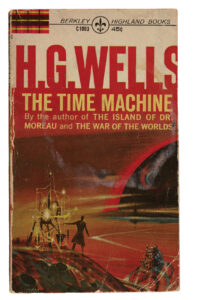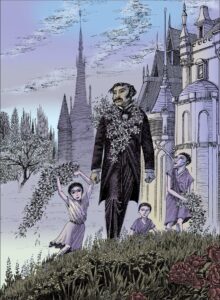Equal Only to Your Equal:
Equality and A Caution Towards Egalitarianism in Time Machine
By Efe Bir

H.G. Wells’ Time Machine revolves around an unnamed Victorian scientist who uses his own invention to travel forward in time and encounters two distinct human species: the Eloi and the Morlocks. The Eloi are childlike beings residing in large cities on the surface, seemingly lacking intelligence, while the Morlocks are brutish creatures who toil underground, serving the Eloi’s cities and occasionally preying upon them. Promptly, the time traveller concludes that this division within the human species stems from societal class distinctions, which have become so extreme that they resulted in the emergence of two distinct species. The novel serves as a cautionary tale emphasizing the importance of equality and egalitarian practices as values, while also warning against the dangers of implementing these values in a misguided manner.
The text primarily reflects these values through the lens of fear. The time traveller’s journey into the unknown instils a profound sense of fear in the reader, initially stemming from the unfamiliar environment encountered by the time traveller. As the traveller encounters the Morlocks, fear transitions from the unknown to a fear for his own and the Eloi’s lives. However, it is the sight of Eloi society and their stark contrast with the Morlocks that triggers a much deeper fear within him. At first, he perceives the Eloi as an advanced communist civilization, where everyone appears equal and content. Yet, upon encountering the Morlocks and witnessing their living conditions, he immediately recognizes the parallels between the Eloi-Morlock relationship and the divide between the wealthy and the impoverished, as well as between capitalists and laborers. This realization greatly concerns him, serving as a revelation about his own time and warning against the imminent dangers of a society where class divisions are so severe that they completely detach from one another. Reflecting on this connection, the traveller notes, “even now, does not an East-end worker live in such artificial conditions as practically to be cut off from the natural surface of the earth?” (49), highlighting that the conditions in his own time are not fundamentally different from those of the Eloi and the Morlocks. Thus, his fear lies in the fact that he sees this division as an extension of his present time, where class divisions and inequality are steadily increasing.
What is intriguing in Wells’ narrative is not only the emphasis on equality as a foundational value over class divisions but also the notion that a flawed implementation, varying between different classes, could bring about a more destructive future for society. In other words, a divided notion of equality where the rich and the poor are equal only within their respective spheres can be just as perilous as complete inequality, as it renders each party vulnerable in its own way. Consequently, the novel advocates for a comprehensive equality and order for every individual, emphasizing its necessity by depicting the consequences of its absence.

